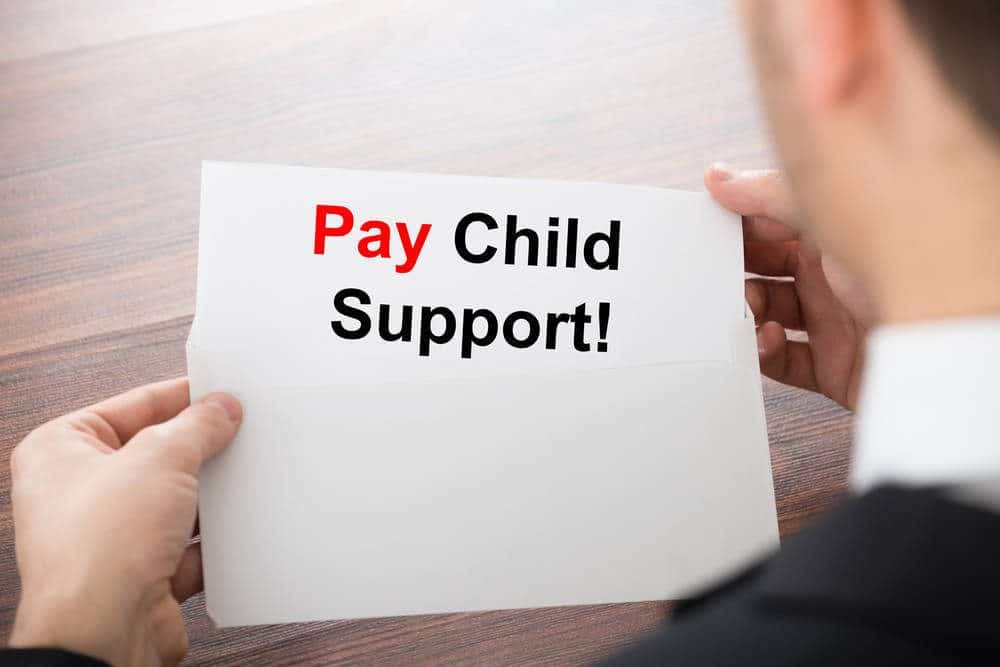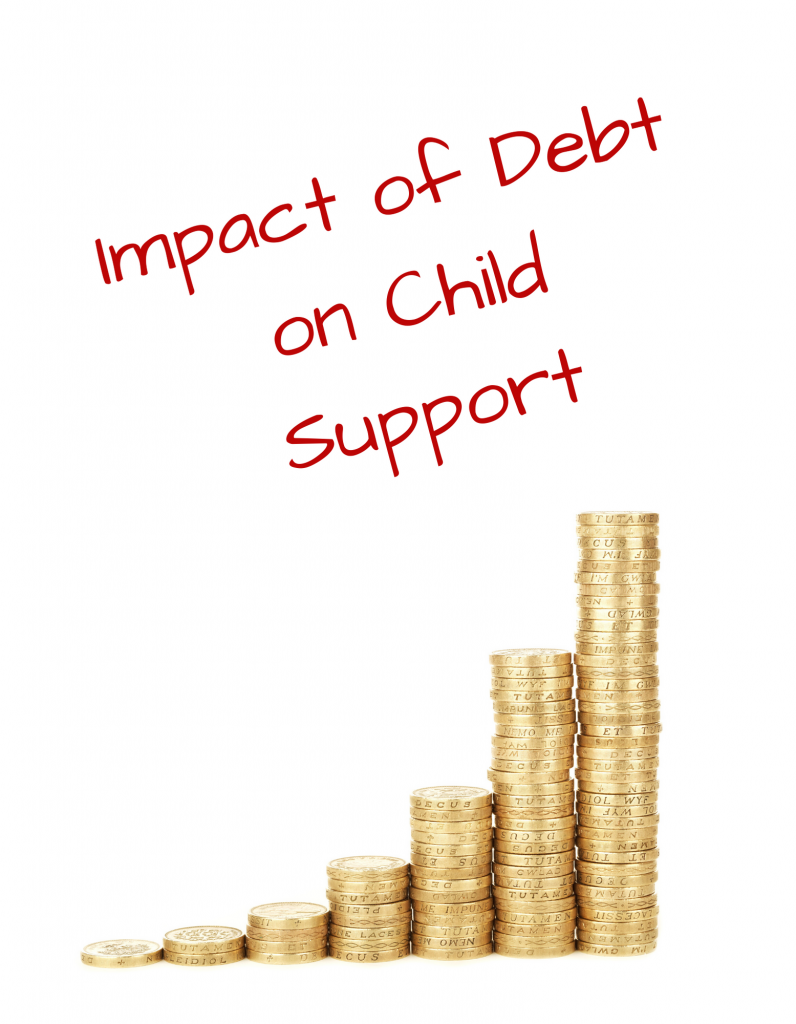The Relationship Between Child Support and Debts in Arizona

Table of Contents
Increase in Debts as a Basis to Modify or Terminate Child Support in Arizona
Some people have asked about the relationship between child support and debts in Arizona. Stated differently, does a judge take into consideration the amount of debts a parent has to pay when calculating child support.
The short answer to that question is, no, a judge in Arizona will not take into consideration the amount of debts a parent has to pay when calculating child support in Arizona.
This principle of Arizona law was recognized when the Arizona Court of Appeals answered that question in the case of Jorgenson v. Jorgenson.
The Arizona Court of Appeals examined whether a parent incurring significantly more debts since child support was previously calculated provides a basis to modify that parent’s child support obligation pursuant to Arizona Revised Statute Section 503(E).

Facts of Jorgenson vs. Jorgenson
Husband and Wife divorced in 1978.
Father was order to pay $200 in child support per month for each of their two children.
The child support payments for the parties’ son were to cease when he would later take up residence with Father and the payments for their daughter were to increase to $300 after her twelfth birthday. By October of 1980, the parties’ son had moved in with Father.
Modification or Termination of Child Support in Arizona Based on a Parent’s Increase in Debts

Father filed a petition to modify child support, alleging that a substantial and continuing change of circumstances had occurred, and asked to terminate his child support payments to Mother.
Father, among other things, alleged he had incurred more debt since the divorce and that increase in his debts constituted a substantial and continuing change in circumstances to modify or terminate his child support obligation to Mother.
The Impact of Debts on Child Support in Arizona
The appellate court ruled a parent obligated to pay child support may not avoid that obligation by voluntarily incurring debts. Instead, the appellate court noted that the child support obligation is the parent’s primary financial obligation over all other debts.
In short, the fact that a parent cannot both pay child support and service all their monthly debts is not a basis to modify or termine child support in Arizona because the obligation to pay child support is paramount to all other debts a parent may incur.
Parents Debts Have No Affect on Child Support in Arizona
A substantial and continuing change in financial circumstances can be used as a basis to modify or terminate child support. However, an increase in the amount of debts a parent accrues does not provide a basis for a parent to seek a modification or termination of child support in Arizona.
Increased Debt is Not a Defense to Contempt of Court for Not Paying Child Support in Arizona

The ruling in this case could also be expanded to preclude a parent from defending their failure to pay child support in a contempt proceeding in Arizona becuase they allege the couldn’t afford to pay the full child support amount because child support is a parent’s primary financial obligation over all other finacial obligations, including debts.
Arizona Child Support Attorneys | Hildebrand Law, PC
If you have questions about the relationship between child Support and debts in an Arizona divorce case, you should seriously consider contacting the attorneys at Hildebrand Law, PC. Our Arizona child support and family law attorneys have decades of combined experience successfully representing clients in child support and family law cases.
Our family law firm has earned numerous awards such as US News and World Reports Best Arizona Family Law Firm, US News and World Report Best Divorce Attorneys, “Best of the Valley” by Arizona Foothills readers, and “Best Arizona Divorce Law Firms” by North Scottsdale Magazine.
Call us today at (480)305-8300 or reach out to us through our appointment scheduling form to schedule your personalized consultation and turn your Arizona child support or family law case around today.
Contact Form
Frequently Asked Questions About Arizona Child Support:
Can child support arrears be forgiven in Arizona?
In most cases, the parent owed child support can waive the child support arrears but cannot waive any amounts that may be due to the State of Arizona for reimbursement of public assistance payments to the custodial parent.
How far behind in child support before you go to jail in Arizona?
There is no set amount of time or money a person has to have failed to pay child support before that person is incarcerated for Contempt of Court for failing to pay child support in Arizona.
What are the consequences of not paying child support in Arizona?
The consequences of not paying child support include being held in contempt, being incarcerated until you pay the child support.
Other Articles About Child Support in Arizona
- ARIZONA CHILD SUPPORT LAWS
- THE DEFINITIVE GUIDE TO CHILD SUPPORT IN ARIZONA
- ARIZONA UNIFORM INTERSTATE FAMILY SUPPORT ACT (UIFSA) STATUTES
- ATTRIBUTING INCOME FOR CHILD SUPPORT IN ARIZONA
- DIVIDING UNCOVERED MEDICAL EXPENSES IN AN ARIZONA CHILD SUPPORT CASE
- DUE PROCESS REQUIRES NOTICE OF A CHILD SUPPORT MODIFICATION
- CHILD SUPPORT DEVIATION IN ARIZONA
- IS AN INCREASE IN INCOME CAUSE TO MODIFY CHILD SUPPORT IN ARIZONA
- CHILD SUPPORT AND ASSETS IN ARIZONA
- EFFECT OF EMPLOYMENT BENEFITS ON CHILD SUPPORT IN ARIZONA
- EFFECT OF STOCK OPTIONS ON CHILD SUPPORT IN ARIZONA
- MODIFYING CHILD SUPPORT FROM ANOTHER STATE IN ARIZONA
- CHILD SUPPORT MUST BE MODIFIED WHENEVER CHILD CUSTODY ORDERS CHANGE IN ARIZONA
- BURDEN OF PROOF FOR A DEVIATION IN CHILD SUPPORT IN ARIZONA
- REIMBURSEMENT FOR OVERPAID CHILD SUPPORT IN ARIZONA
- GIFTS AND FREE RENT MAY BE INCOME FOR CHILD SUPPORT PURPOSES
- COURT DISCRETION TO ADD RECURRING GIFTS AS INCOME FOR CHILD SUPPORT
- CHILD SUPPORT AND THE NARCISSIST PARENT
- INCLUDING INCOME FROM A SECOND JOB IN ARIZONA CHILD SUPPORT CALCULATIONS
- STANDARD OF PROOF TO ESTABLISH A WAIVER OF PAST CHILD SUPPORT IN ARIZONA
- CHILD SUPPORT CANNOT BE A PERCENTAGE OF A PARENT’S INCOME IN ARIZONA
- WHAT IS A WAGE ASSIGNMENT IN ARIZONA
- THE AGE WHEN CHILD SUPPORT ENDS IN ARIZONA
- SSDI PAYMENTS OFFSET MEDICAL EXPENSES FOR A CHILD IN ARIZONA
- MODIFYING CHILD SUPPORT WHEN NEITHER PARENT LIVES IN ARIZONA
- HOW TO MODIFY OR ENFORCE A CHILD SUPPORT ORDER ISSUED IN ANOTHER STATE
- HOW TO MAKE ARIZONA CHILD SUPPORT PAYMENTS
- HOW IS INCOME CALCULATED FOR CHILD SUPPORT IN ARIZONA
- HOW TO ENFORCE A CHILD SUPPORT ORDER IN ARIZONA
- WHAT IS CONSIDERED GROSS INCOME FOR ARIZONA CHILD SUPPORT
- CALCULATING A PARENT’S INCOME FOR CHILD SUPPORT IN ARIZONA
- ERRORS IN REGISTERING A CHILD SUPPORT ORDER FROM ANOTHER STATE IN ARIZONA
- DOMESTICATING A CHILD SUPPORT ORDER IN ARIZONA
- CHILD SUPPORT AND AN UNEMPLOYED PARENT IN ARIZONA
- WHAT DOCTORS SHOULD KNOW ABOUT CHILD SUPPORT IN ARIZONA
- CAN A NON-CUSTODIAL PARENT RECEIVE CHILDREN’S SOCIAL SECURITY BENEFITS IN ARIZONA
- START DATE FOR TEMPORARY SUPPORT IN ARIZONA
- EFFECT OF DENIAL OF VISITATION ON CHILD SUPPORT PAYMENTS IN ARIZONA
- ARIZONA CHILD SUPPORT FREQUENTLY ASKED QUESTIONS
- EFFECT OF ERRORS IN REGISTERING A CHILD SUPPORT ORDER FROM ANOTHER STATE IN ARIZONA
- WHEN YOU CAN MODIFY CHILD SUPPORT IN ARIZONA
- GIFT INCOME AND MODIFICATION OF CHILD SUPPORT IN ARIZONA
- WAIVER OF PAST CHILD SUPPORT BY AGREEMENT IN ARIZONA
- UPWARD DEVIATION IN CHILD SUPPORT IN ARIZONA
- MODIFYING A CHILD SUPPORT ORDER FROM ANOTHER COUNTRY
- OBJECTION TO CHILD SUPPORT ARREARS IN UIFSA DOMESTICATION IN ARIZONA
- CAN A SPOUSE’S INCOME BE CONSIDERED FOR CHILD SUPPORT IN ARIZONA
- LEGAL METHODS OF COLLECTING CHILD SUPPORT PAYMENTS IN ARIZONA
- ENFORCEMENT OF A FOREIGN COUNTRY CHILD SUPPORT ORDER IN ARIZONA
- DRIVERS LICENSE RESTRICTIONS FOR UNPAID CHILD SUPPORT IN ARIZONA
- CAN A LOAN BE INCLUDED AS INCOME FOR CHILD SUPPORT IN ARIZONA
- OVERPAYMENT OF CHILD SUPPORT IN ARIZONA
- PAST DUE SUPPORT PAYMENTS APPLY FIRST TO CHILD SUPPORT BEFORE ALIMONY
- CALCULATING CHILD SUPPORT WITH SPLIT CUSTODY OF CHILDREN IN ARIZONA
- EFFECT OF DELAY IN COLLECTING CHILD SUPPORT ARREARAGES IN ARIZONA
- RECOVERING CHILD SUPPORT NOT ORDERED IN A DIVORCE DECREE IN ARIZONA
- LEGAL OPTIONS FOR COLLECTING CHILD SUPPORT PAYMENTS IN ARIZONA
- ARIZONA COURT’S AUTHORITY TO HEAR CHILD SUPPORT ENFORCEMENT ACTIONS
- IMPACT OF WITHHOLDING A CHILD ON CHILD SUPPORT IN ARIZONA
- SISTER STATE’S RIGHT TO MODIFY ARIZONA CHILD SUPPORT RULING
- IS A CHILD SUPPORT ORDER VOID IF IT DOES NOT MENTION ARREARS IN ARIZONA
- CHILD SUPPORT OBLIGATIONS OF A MINOR IN ARIZONA
- TIME LIMIT TO COLLECT CHILD SUPPORT ARREARAGES IN ARIZONA
- RETROACTIVE MODIFICATION OF A CHILD SUPPORT ORDER IN ARIZONA
- CONTEMPT OF COURT FOR UNPAID CHILD SUPPORT ARREARAGES IN ARIZONA
- SUPPORT FOR DISABLED ADULT CHILDREN IN ARIZONA
- CALCULATING INCOME FOR CHILD SUPPORT IN ARIZONA
- DISMISSING MODIFICATION OF CHILD SUPPORT FOR NOT DISCLOSING FINANCIAL DOCUMENTS
- ARIZONA CHILD SUPPORT MODIFICATIONS MUST INCLUDE ANY CHANGES IN PARENTING TIME
- EQUITABLE DEFENSES TO FAMILY SUPPORT IN ARIZONA
- AFFIDAVIT OF CHILD SUPPORT ARREARS FROM ANOTHER STATE IN ARIZONA
- PERSONAL JURISDICTION AND CHILD SUPPORT ARREARAGES IN ARIZONA
- PERSONAL JURISDICTION OVER A NON-RESIDENT IN AN ARIZONA CHILD SUPPORT CASE
- ARIZONA CRIMINAL LAW FOR NON-PAYMENT OF CHILD SUPPORT IS CONSTITUTIONAL
- BURDEN OF PROOF IN A MODIFICATION OF CHILD SUPPORT CASE IN ARIZONA
- FULL FAITH AND CREDIT CLAUSE REQUIRES PERSONAL JURISDICTION TO ENFORCE SUPPORT ORDERS
- CHILD SUPPORT IN A BANK ACCOUNT IS EXEMPT FROM EXECUTION BY CREDITORS
- NON-PARENT LAWSUIT FOR REIMBURSEMENT OF CHILD SUPPORT IN ARIZONA

About the Author: Christopher Hildebrand is an award-winning Arizona divorce and family law attorney with decades of experience with a law practice that has received numerous awards including “US News and World Report Best Law Firms”, “Top Family Law Attorney” from North Valley magazine, “Best of the Valley Family Law Attorneys” from Arizona Foothills Magazine, “Preeminent Attorney AV Rated” attorney from Martindale-Hubbell, and many others.
